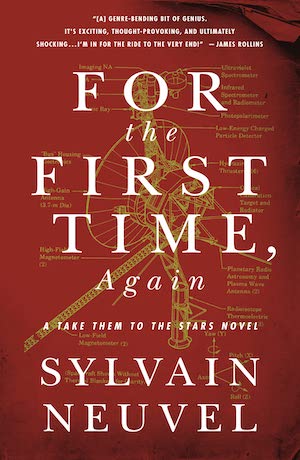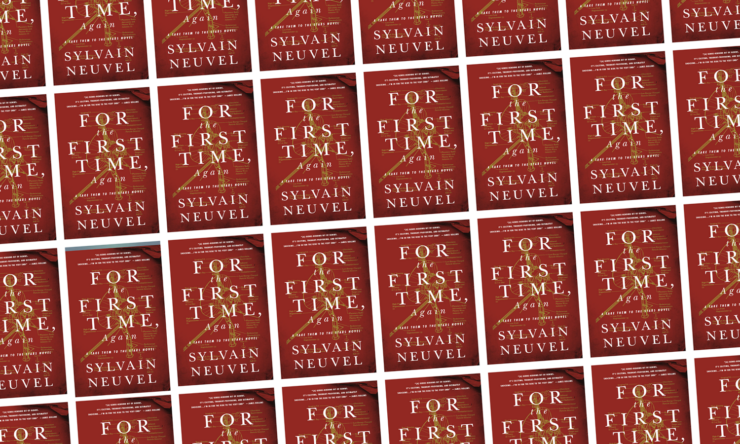Sylvain Neuvel’s 2021 novel A History of What Comes Next began the Take Them to the Stars series—which told the story of the Kibsu, a series of mothers and daughters working behind the scenes to jump-start humanity’s exploration of space. There’s also the Tracker, a series of adversaries that follow them over the years; book two, Until the Last of Me, provided more nuance to the Trackers while also revealing more about the extraterrestrial origins of both, centuries earlier.
Over the course of those two novels, Neuvel established a compelling template, largely consisting of rapid-fire first-person impressions and dialogue from whatever Kibsu was at that book’s heart, along with historical vignettes that provided mysteries and backstory in equal measure. Neuvel also made it adamantly clear that he was willing to do shocking things to his characters; this is a series about successive generations, and that means a few moments where one book’s beloved protagonist might die abruptly to further their mission.
Buy the Book


For the First Time, Again
By the time For the First Time, Again has begun, there’s just one Kibsu left, a teenager named Aster. It’s late in 1999 when this novel catches up with her, and it’s not long after this that her path intersects with that of Samael, the last Tracker, who takes on something of a mentor role for Aster. Their meeting comes after Aster is injured, with a blood test alerting the U.S. government to her existence. It’s here that she encounters one of this novel’s recurring characters, a military man whom Aster refers to in terms of his resemblance to Bruce Willis.
Neuvel established earlier in the trilogy that the Tracker was more aware of their origins than the Kibsu, and he makes that much more clear here, opening the book with an extraterrestrial being en route to Earth and altering certain physical characteristics to better fit in. That the government has a sample of her blood ends up becoming a cause for concern for Aster, though it also provides some further explanations for how Aster is genetically different from other people.
It also reveals that Aster is not a fan of Alien: Resurrection. Here she is, musing about the dangers of the government having access to her genetics:
“They want to make more of me. I seen this before, in that bad Alien movie with Winona Ryder. They mixed dead Ripley’s blood with the alien’s and then she finds this room with all the failed experiments. There’s Ripleys everywhere. Ripleys with two heads, three arms. That’s it. I’m dead Ripley now.”
The cinematic references abound in this novel, especially early on; Aster’s primary point of reference for a lot of things ends up being the movies she’s seen. This can be a little overwhelming, but it does lead to one of the book’s funnier moments, where Aster pranks the much more dour Samael by saddling him with a cinematic alias. The first half of For the First Time, Again follows more than a few action movie tropes as well; in pairing a teenage girl with an older, more violence-prone mentor, there’s a bit of The Professional in its DNA.
In the second half of this novel, Neuvel returns to an aspect of the trilogy that was more central to its first volume: the idea of the Kibsu funding every possible avenue that there might be to get humanity deeper into space. This was one of the trilogy’s most interesting elements, and the return of it felt right from a dramatic perspective. It was also eminently readable, though the loss of the earlier novel’s Cold War setting downplayed some of the tension.
In my review of Until the Last of Me, I mentioned that the breakneck pace at which Neuvel recounts events in these books is thrilling but can sometimes feel like things are moving a little too fast. That element is still at play here, but I was far less frustrated with it this time out—largely because Neuvel used that briskness as a kind of misdirection to a late-in-the-game plot development. To say more would be to spoil something critical, but suffice to say, Neuvel accomplished the feat of making something that seemed innocuous turn out to be crucial.
Deft plotting abounds in all three volumes of this trilogy, though some of the most intriguing elements of all of the books emerge from Neuvel’s notes at the end of the book explaining the real history that informed the trilogy. This one is no exception, and brings the reader very close to the present day. There’s also a suggestion that, even though this trilogy might be over, Neuvel might have other plans for this setting; if that is the case, I’ll be intrigued to see where he takes these worlds next.
For the First Time, Again is published by Tordotcom Publishing.
 Tobias Carroll is the managing editor of Vol.1 Brooklyn. He is the author of the short story collection Transitory (Civil Coping Mechanisms) and the novel Reel (Rare Bird Books).
Tobias Carroll is the managing editor of Vol.1 Brooklyn. He is the author of the short story collection Transitory (Civil Coping Mechanisms) and the novel Reel (Rare Bird Books).










